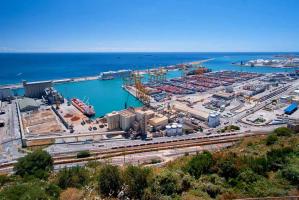Amsterdam bans creation of new hotels
Another piece in the overall strategy to reduce tourist flows to the city
 TheMayor.EU logo
TheMayor.EU logo It starts on Wednesday and will be the longest in the history of the country
The German railway sector has entered a true chronic crisis phase with the announcement that GDL, the trade union representing train workers, is calling a 6-day strike starting on Wednesday, 24 January, at 2 am in the morning. Effectively, this means that most of the train services in the country will be disrupted until the end of this week. According to Deutsche Bahn (DB) only about 1 in 5 of scheduled long-distance, and many regional, services will be able to depart.
The new industrial action comes hot on the heels of another railway strike that took place earlier this month and will be the third such labour protest in the German sector in less than two months. What’s more, the length of the announced strike means that if it goes on for the entire period, it will be the longest in Deutsche Bahn’s history.
The strike will also include cargo trains and their services will be disrupted even earlier – from Tuesday, 23 January, at 6 pm. The previous record set by a railway strike in Germany was five days in 2015.
“What is coming now will be more powerful, longer and harder for customers” than the walkouts so far, declared the GDL's chairman earlier this month, according to Euronews. And indeed, this threat is now coming to fruition as the dispute between the company and the workers has become an issue that is of concern to a large chunk of the German society that relies on regular services for their commuting needs.
GDL stated that they have rejected the third offer made by DB as, according to them, it was confrontational and showed no desire to reach an agreement. Railway workers are demanding a raise of 555 euros per month plus a one-time payment of up to 3,000 euros to counter inflation. DB has offered an 11 percent raise.
The scope of the announced strike can also present a veritable threat to the German economy, which is already in recession and has been affected by the shipping disruptions caused by the Houthi attacks in the Red Sea.
According to Reuters, the strike could cost the transport sector 30 million euros a day, but significantly more damage would be done if factories had to stop production due to supply problems.

Legislators and magnates have to await a preliminary ruling from the European Court of Justice

The building will then serve as the site for a new museum dedicated to Finnish-Russian relations

Another piece in the overall strategy to reduce tourist flows to the city

In addition, the federal government has launched the National Week of Action against Bicycle Theft to raise awareness of the issue and the new solution

The facility will replace the need to have water supplied by tankers from Valencia

Modern traffic lights do more than regulate the flow of vehicles at crossroads, they also collect enormous amounts of data

Experimenting with public transport provision in Germany is clearly in a state of creative fervour

Legislators and magnates have to await a preliminary ruling from the European Court of Justice

It also set the standards for a better European parking card for people with disabilities

The benefit will last until the Dutch parliament adopts the transgender law

Experimenting with public transport provision in Germany is clearly in a state of creative fervour

It also set the standards for a better European parking card for people with disabilities

Urban dwellers across the EU are having a say in making their surroundings friendlier to people and the environment.

Forests in the EU can help green the European construction industry and bolster a continent-wide push for architectural improvements.

Apply by 10 November and do your part for the transformation of European public spaces

Catch up with some recommendations for the 2024 European Capital of Culture programme from the mayor of Tartu

An interview with the ICLEI regional director for Europe аfter the close of COP28

An interview with a member of the No Hate Speech Network team













